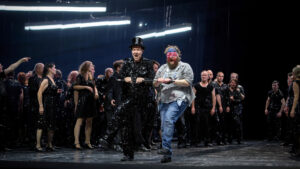The monologue comes from Canto XXXIII of Inferno and, while not famous like Canto V’s Paolo and Francesca, is nonetheless one of the most popular segments of the poem. Ugolino, a politically ruthless count from 13th century Pisa, is condemned as a “traditore di famiglia” and in a grisly episode narrates how at the end of his life he was imprisoned with his young sons in a tower. (The speech is itself a break from his endless gnawing on the skull of the bishop that imprisoned him.) All of them famished, the sons — shortly before dying — offer themselves as a meal for the Count and Dante implies that Ugolino takes them up on the offer, saying, “Poscia, più che ‘l dolor, poté ‘l digiuno.” (Hunger did what sorrow could not do.) The Romantics of Donizetti’s stripe loved (and liberally reappropriated) Dante and this monologue was written for the very famous Luigi Lablache.
I enjoy this recent performance from the Italian baritone Luca Micheletti who does a fine job suggesting the different voices (Dante’s, Ugolino’s, and those of the children) that the monologue encompasses. There’s something propulsive, Erlkönig-esque about how Donizetti sets this moment, but it also maintains the horrifying expansiveness of Dante’s original. (By the time I get to this part of Inferno, one canto away from the end, I am always ready to be done.) Apart from its macabre subject matter, one wonders why more baritones/basses don’t include this in their recitals.


